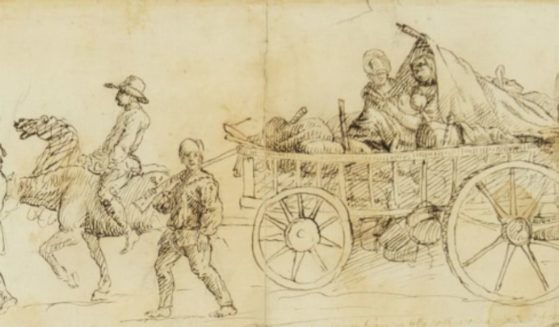Car Journalists Drive Cross-Country in EV - Spend More Than an Entire Work Day Charging
Roman Mica and Nathan Adlen, TFLEV YouTube personalities, decided to do their own version of the old Cannonball Run coast-to-coast race but with a couple of twists.
First, their trek would not be illegal, like runs conducted in the 1970s that disregarded traffic laws; secondly, they would run coast-to-coast in an electric car.
Sounds like fun, right?
“I’m so glad it’s over,” Adlen sighed at the end of the 46-hour, 46-minute trip from Orange County, California, to Orange County, Florida.
“I don’t want to do this again.”
Their 2,500-mile trip was a fundraiser for a children’s charity and used a Hyundai Ioniq 5.
Driving the EV presented unique challenges, such as having to balance speed against battery drain, navigating charger “deserts,” and adding an extra 8 or 9 hours to their trip due to wait times for battery charging.
On their trip, Mica and Adlen sometimes had to drive about 20 mph below the speed limit in order to conserve battery power.
[firedly_poll]
Rural areas presented a challenge in finding chargers. For instance, driving through Alabama they had to drive 12 miles off their Interstate 10 route to find a suitable charger. The 12 miles back to the interstate meant a total of 24 miles wasted.
In effect, the two YouTubers were attempting to somewhat replicate several coast-to-coast races in the 1970s that were part of a protest against the then-federally mandated nationwide 55 mph speed limit.
And their use of an electric vehicle was presented as a challenge for other EV drivers to attempt to beat their time.
Toward the end of the trip, Mica and Adlen reflected on what they had done and how an electric vehicle fit into the type of trip they had taken.
“What do you think?” Mica asked. “Are EVs the future? Are they not the future? Or is it too early to tell?”
“Considering how new they are,” Adlen responded, ”you know, when I say new I mean I know that we’ve had Teslas and Nissan Leafs around for awhile, but I’m referring to what I consider the modern electric vehicle — something that can have a range of over 250 miles, so then they can be charged rapidly and not have a battery that necessarily ignites the minute you spit on it.
“These are things that are really important, right?” Adlen continued. “And I think that now we are at that point, and we’re just starting to see those electric vehicles.
“Yes there’s potential — a lot of potential — however, the infrastructure obviously needs a lot of fine tuning,” he said.
“We’ve just had a couple hard knocks at certain stations along the way. Most have been fantastic, but there have been some problems.
“We wish the cars would be a little tiny bit more accurate [in display calculations], and this is across the board when it comes to highway driving. Highway driving is still kind of a hit or miss …
“It’s the Achilles heel of electric cars,” Mica interjected. “It uses a lot of power.”
“It uses a lot of power,” Adlen repeated. “But also at the predictive amount of juice it’s going to be using in many cases isn’t that accurate or it’s a little too off, right? And it’s not as predictable as it should be.”
There are other issues surrounding electric cars.
First, there is the aggressive push toward them by the government hand-in-hand with auto manufacturers, despite reluctance on the part of the average buyer concerned about EV price and the infrastructure problems Adlen and Mica experienced.
And as governments and banks squeeze the foundation of internal combustion engine infrastructure — petroleum — is there a danger that consumers will be pressured out of private vehicles in general because of the high costs of fuel and of the vehicles themselves?
Perhaps that’s the plan.
More than a hundred years ago, the gasoline-powered Ford Model T gave individuals freedom and independence. Governments, we’re seeing, increasingly hate that.
Contrary to the hopes of Adlen and Mica, EVs may never be compatible with trips on the open road. They may only be useful, along with public transportation, in controlled urban settings.
Truth and Accuracy
We are committed to truth and accuracy in all of our journalism. Read our editorial standards.












